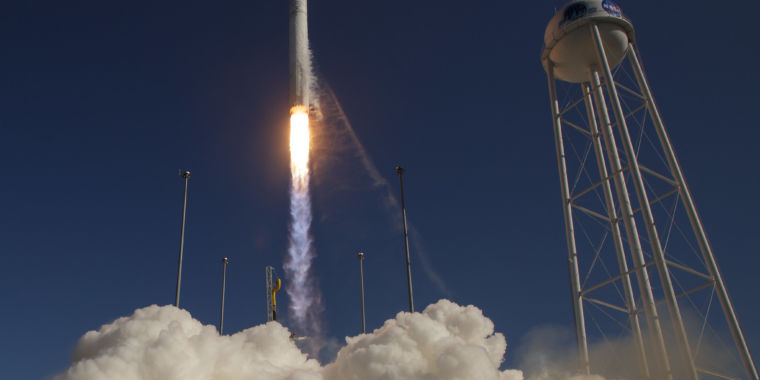
-
Well, at least the bots got the launch countdown right.NASA/Facebook
-
But it went off the rails pretty quickly.NASA/Facebook
-
Not going to the ISS, but the "ice sets."NASA/Facebook
-
Alright, maybe the caption service can pull it together. Got this one right.NASA/Facebook
-
Wait—what did you say? That's not "core pressurization looks good."
-
Is this launch sponsored by Comcast or something?NASA/Facebook
-
Yes, these captions are phenomenal. But what we think you meant here is "TVC is nominal," which means the thrust vector control system is working and the rocket is maintaining the proper attitude.
-
We don't have a clue, folks. In Romanian, "prost" means simple-minded, stupid, and poor, all of which are apt descriptors of these auto-captions.NASA/Facebook
-
"Attitude remains nominal." It's really not that hard.NASA/Facebook
-
"Nominal."NASA/Facebook
-
Let's hope the RD-181 engines aren't rattling.NASA/Facebook
-
Wait, this isn't a crewed launch.NASA/Facebook
-
This seems almost like poetry.NASA/Facebook
An Antares rocket built by Northrop Grumman launched on Wednesday afternoon, boosting a Cygnus spacecraft with 3.4 tons of cargo toward the International Space Station. The launch from Wallops Island, Virginia, went flawlessly, and the spacecraft arrived at the station on Friday.
However, when NASA's International Space Station program posted the launch video to its Facebook page on Thursday, there was a problem. Apparently the agency's caption service hadn't gotten to this video clip yet, so viewers with captions enabled were treated not just to the glory of a rocket launch, but the glory of Facebook's automatically generated crazywords. As of Thursday morning, 86,995 people had watched the Facebook video.
Some of the captions are just hilariously bad. For example, when the announcer triumphantly declares, "And we have liftoff of the Antares NG-11 mission to the ISS," the automatically generated caption service helpfully says, "And we have liftoff of the guitarist G 11 mission to the ice sets."
Now, you might note—correctly—that there is a lot of jargon within that single statement at liftoff. After all, the announcer uses a relatively unfamiliar rocket name, "Antares," along with the abbreviation "NG-11" for Northrop Grumman's 11th supply mission to the station, and "ISS" for the International Space Station. But YouTube's auto-caption service seemed to have no problem with those bits of space argot.
And there are more mangled phrases throughout the 1 minute, 20 second clip on NASA's Facebook page, which some off the commenters definitely noticed. Scott McKee helpfully advises other viewers to "Play it without sound and we have the launch of the Guitarist G11 mission. Rock on NASA!"
We certainly think captions on videos are very useful things. Some people simply prefer written text—but most importantly, captions improve accessibility for those who are deaf or hard of hearing. But when captions are this bad, they're essentially worthless (or, worse, they make a mockery of a serious scientific endeavor).
As Facebook aspires to put out its own rival to Alexa in the AI voice assistant market, perhaps the company should start by improving its lousy auto-caption bots.
Listing image by NASA
https://arstechnica.com/science/2019/04/facebook-launch-video-captions-have-issues-core-pressures-asian-looks-good/
2019-04-19 13:10:00Z
CBMic2h0dHBzOi8vYXJzdGVjaG5pY2EuY29tL3NjaWVuY2UvMjAxOS8wNC9mYWNlYm9vay1sYXVuY2gtdmlkZW8tY2FwdGlvbnMtaGF2ZS1pc3N1ZXMtY29yZS1wcmVzc3VyZXMtYXNpYW4tbG9va3MtZ29vZC_SAXlodHRwczovL2Fyc3RlY2huaWNhLmNvbS9zY2llbmNlLzIwMTkvMDQvZmFjZWJvb2stbGF1bmNoLXZpZGVvLWNhcHRpb25zLWhhdmUtaXNzdWVzLWNvcmUtcHJlc3N1cmVzLWFzaWFuLWxvb2tzLWdvb2QvP2FtcD0x
Tidak ada komentar:
Posting Komentar